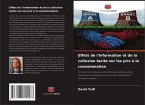The topic of asymmetric price transmission refers to the observation that increasing marginal costs lead to quicker consumer price adjustments than decreasing marginal costs. Changes in the marginal cost regime, and consequently in consumer prices, trigger a response from consumers, who expect lower or higher prices based on the previous period's reference price and thus decide to decrease or increase their search behaviour, respectively. This allows firms to charge prices further from or closer to marginal costs, leading to relatively higher or lower prices for consumers.Increasing information transparency without changing the marginal cost regime should therefore also lead to lower prices for consumers, as obtaining information becomes cheaper for the marginal consumer. However, increasing information transparency also makes it easier for firms to monitor their rivals' pricing strategies. This enables tacit collusion, as deviations from a tacitly collusive agreement can be efficiently detected and punished, deterring defective behaviour. Consequently, access to price information is a key component.
Bitte wählen Sie Ihr Anliegen aus.
Rechnungen
Retourenschein anfordern
Bestellstatus
Storno








